Increasing Pressure to Emigrate
The SS Security Service (SD), which has been handling the “Jewish policy” up to now, draws the conclusion from the Évian Conference that Germany cannot achieve the complete expulsion of its Jewish population through their emigration to other countries. Thus, under the leadership of the Gestapo, the National Socialist regime moves to deport some Jews directly from Reich territory and to increase the pressure on them to emigrate by subjecting them to physical terror, shutting them out of certain professions and trades, and confiscating their property.
Germany’s introduction of the forced names “Sara” and “Israel” and the marking of Jews’ passports with a red “J” in October 1938 makes Jews more easily recognizable to immigration authorities abroad. Together with the increased economic plundering of Jews, this further reduces their chances of obtaining entry permits. Even so, 78,000 Jews manage to emigrate from Germany in 1939, almost twice as many as in the previous year.
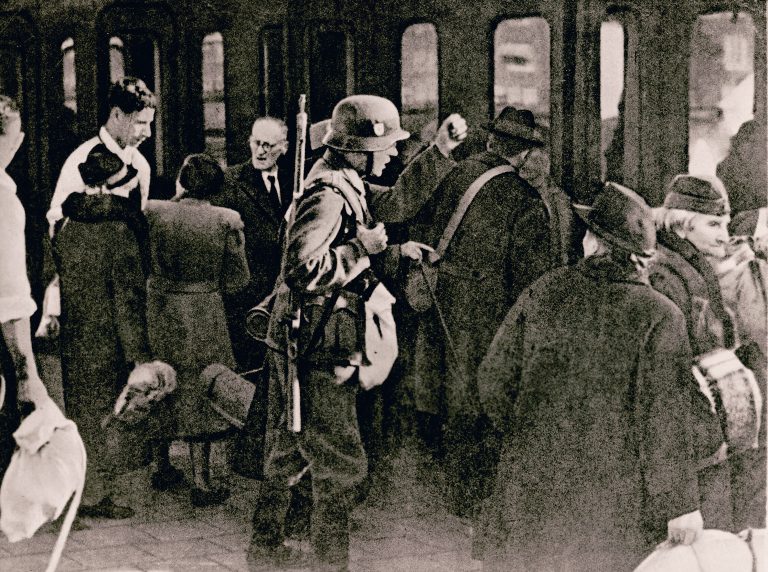
Deportation of Jews of Polish nationality, October 28/29, 1938
After the Polish government announces that it will withdraw the citizenship of Polish Jews living abroad, the German Reich arrests some 17,000 Jewish men, women and children with Polish passports across Reich territory on October 28/29, 1938 and brings them to the Polish border on special trains. About 10,000 of them wander for weeks in the no man’s land between the German town of Neu Bentschen and the Polish town of Zbąszynek.
American Jewish Joint Distribution Committee, Archives, New York, NY
Deportation of Jews of Polish nationality, October 28/29, 1938
After the Polish government announces that it will withdraw the citizenship of Polish Jews living abroad, the German Reich arrests some 17,000 Jewish men, women and children with Polish passports across Reich territory on October 28/29, 1938 and brings them to the Polish border on special trains. About 10,000 of them wander for weeks in the no man’s land between the German town of Neu Bentschen and the Polish town of Zbąszynek.
American Jewish Joint Distribution Committee, Archives, New York, NY
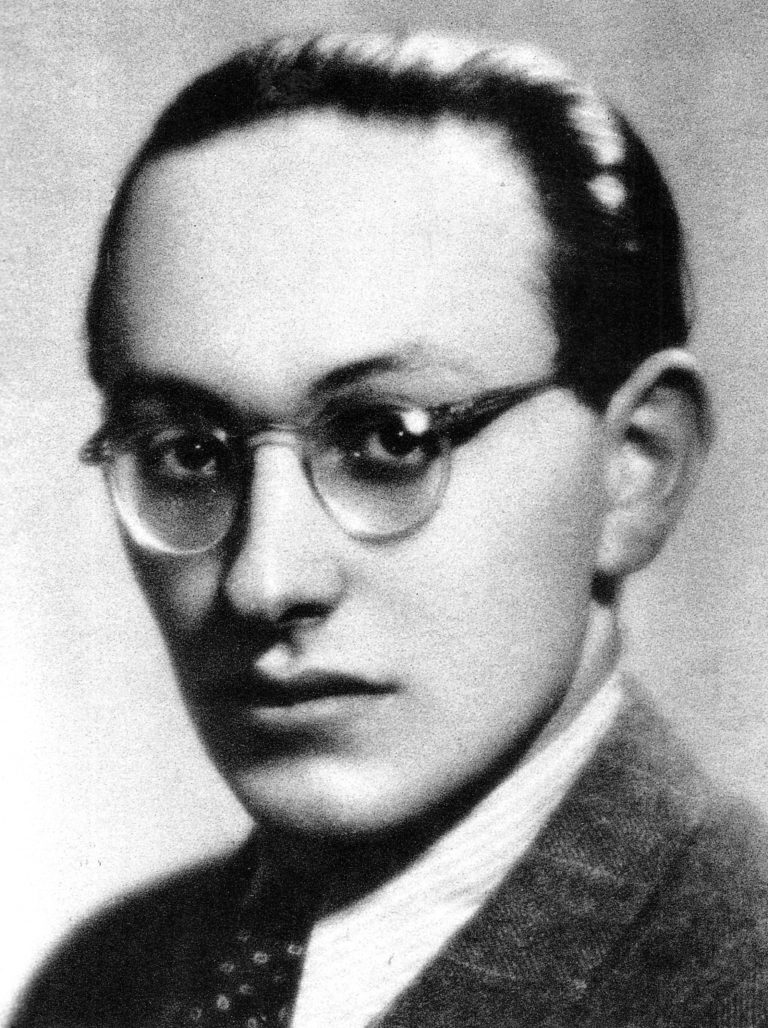
Marcel Reich in Warsaw Ghetto, 1942
The son of a factory owner in Włocławek, Poland, Marcel Reich is sent to relatives in Berlin at the age of eight in 1928 to attend secondary school. He is deported to Warsaw in October 1938 as part of the “Polen-Aktion” (action against Poles). He manages to survive the ghetto and the underground, and eventually becomes Germany’s most prominent post-war literary critic: Marcel Reich-Ranicki.
Photo: Leon Forbert, Warschau / Ida Thompson-Ranicki, Edinburgh
Marcel Reich in Warsaw Ghetto, 1942
The son of a factory owner in Włocławek, Poland, Marcel Reich is sent to relatives in Berlin at the age of eight in 1928 to attend secondary school. He is deported to Warsaw in October 1938 as part of the “Polen-Aktion” (action against Poles). He manages to survive the ghetto and the underground, and eventually becomes Germany’s most prominent post-war literary critic: Marcel Reich-Ranicki.
Photo: Leon Forbert, Warschau / Ida Thompson-Ranicki, Edinburgh

Ruins of the torched synagogue on Berlin’s Prinzregentenstraße, November 10, 1938
In protest against the deportation of his parents, 17-year-old Herschel Grynszpan assassinates the German diplomat Ernst vom Rath at the German Embassy in Paris. The National Socialist regime uses the death of its diplomat on November 9, 1938 as an excuse to launch a state-organized pogrom against the Jewish population, declaring it to be an expression of the “people’s wrath.” On the night of November 9–10, 1938, Jewish houses of worship, businesses and homes are set afire, looted and destroyed. More than 100 Jews are murdered.
Photo: Karl H. Paulmann / bpk 00003438
Ruins of the torched synagogue on Berlin’s Prinzregentenstraße, November 10, 1938
In protest against the deportation of his parents, 17-year-old Herschel Grynszpan assassinates the German diplomat Ernst vom Rath at the German Embassy in Paris. The National Socialist regime uses the death of its diplomat on November 9, 1938 as an excuse to launch a state-organized pogrom against the Jewish population, declaring it to be an expression of the “people’s wrath.” On the night of November 9–10, 1938, Jewish houses of worship, businesses and homes are set afire, looted and destroyed. More than 100 Jews are murdered.
Photo: Karl H. Paulmann / bpk 00003438
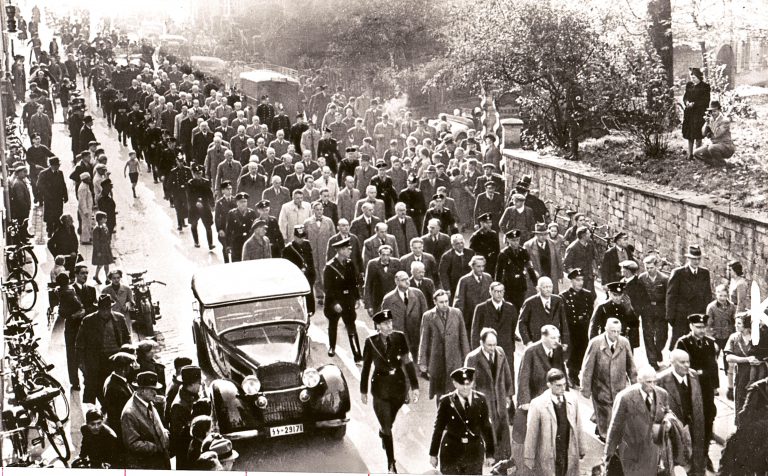
SS men and police take away the Jewish men they have arrested, Baden-Baden, November 10, 1938
On this and the following days, more than 26,000 Jews are deported to the concentration camps Buchenwald, Dachau and Sachsenhausen, where hundreds die. The survivors are only released if their families can prove their intention and capability to leave the German Reich immediately.
Bundesarchiv, Koblenz, Bild 183-86686-0008
SS men and police take away the Jewish men they have arrested, Baden-Baden, November 10, 1938
On this and the following days, more than 26,000 Jews are deported to the concentration camps Buchenwald, Dachau and Sachsenhausen, where hundreds die. The survivors are only released if their families can prove their intention and capability to leave the German Reich immediately.
Bundesarchiv, Koblenz, Bild 183-86686-0008

“Tough, but just,” Der Angriff, November 14, 1938
On November 12, 1938, Hermann Göring, commissioner for the Four-Year Plan, issues an “Ordinance on the Exclusion of Jews from German Economic Life.” Jewish-owned businesses must close by January 1, 1939. In addition, the Jews are ordered to pay 1 billion reichsmarks in damages resulting from the riots – a so-called compensation payment.
Bundesarchiv, Berlin, R 8045-317
“Tough, but just,” Der Angriff, November 14, 1938
On November 12, 1938, Hermann Göring, commissioner for the Four-Year Plan, issues an “Ordinance on the Exclusion of Jews from German Economic Life.” Jewish-owned businesses must close by January 1, 1939. In addition, the Jews are ordered to pay 1 billion reichsmarks in damages resulting from the riots – a so-called compensation payment.
Bundesarchiv, Berlin, R 8045-317
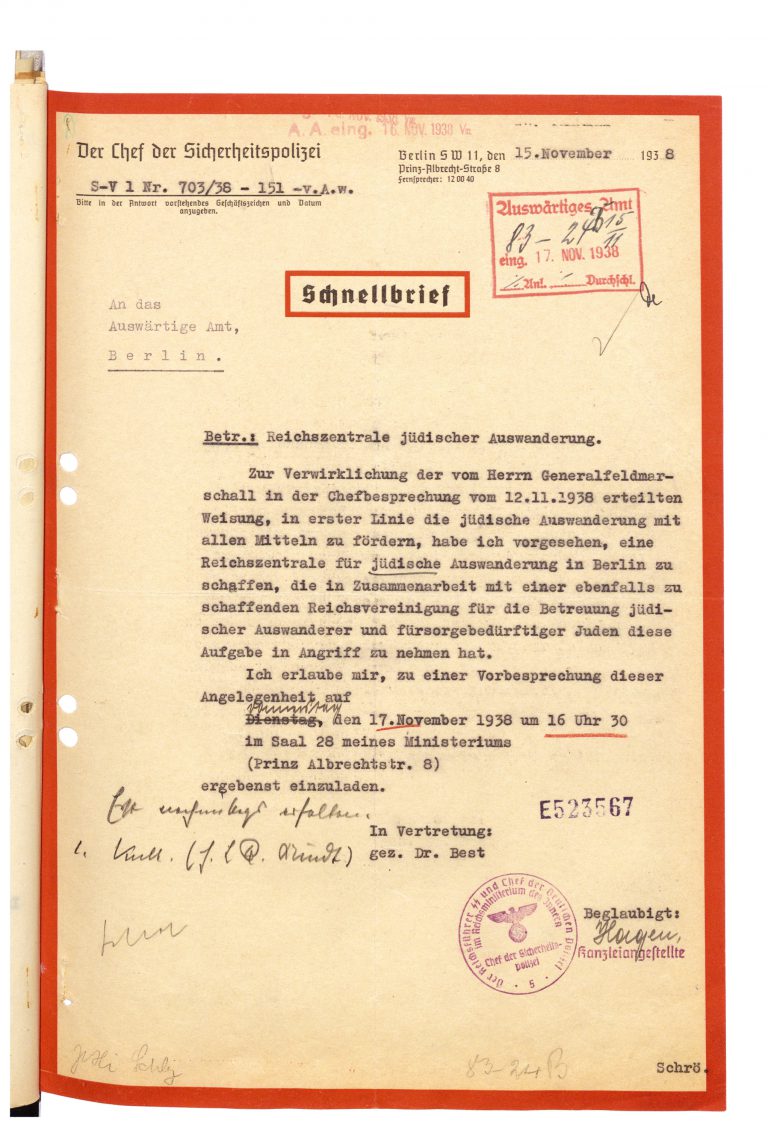
Chief of Security Police to the Foreign Ministry, November 15, 1938
Modeled after Adolf Eichmann’s Central Offices for Jewish Emigration in Vienna and Prague, a Reich Central Office is set up to oversee the bureaucratic coordination of the emigration of Jews. Eichmann’s “Judenreferat” later grows out of this office: It organizes the deportation of Europe’s Jews to the extermination camps.
Auswärtiges Amt / Politisches Archiv, Berlin, R 99366
Chief of Security Police to the Foreign Ministry, November 15, 1938
Modeled after Adolf Eichmann’s Central Offices for Jewish Emigration in Vienna and Prague, a Reich Central Office is set up to oversee the bureaucratic coordination of the emigration of Jews. Eichmann’s “Judenreferat” later grows out of this office: It organizes the deportation of Europe’s Jews to the extermination camps.
Auswärtiges Amt / Politisches Archiv, Berlin, R 99366
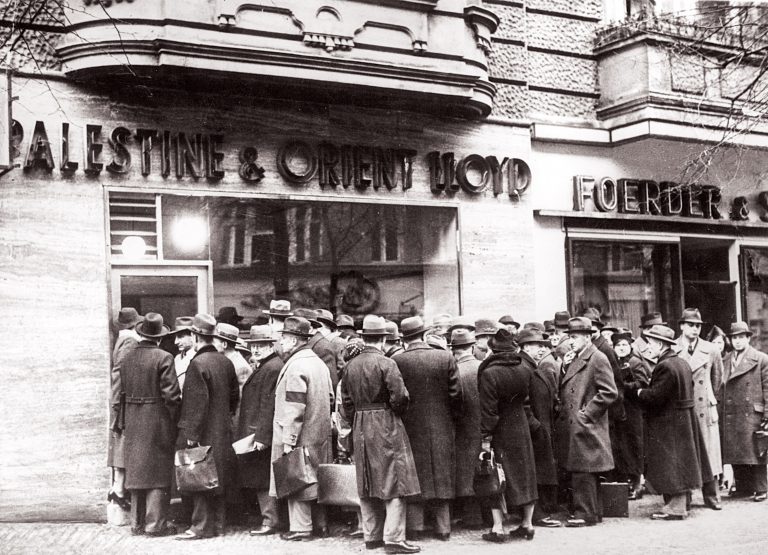
Lining up in front of the “Palestine & Orient Lloyd” travel agency, Meinekestraße 2, January 22, 1939
The Jewish Agency for Palestine’s Palestine Office, located nearby at Meinekestraße 10 in Berlin-Charlottenburg, helps ca. 50,000 people emigrate to Palestine by 1941.
SZ Photo, München
Lining up in front of the “Palestine & Orient Lloyd” travel agency, Meinekestraße 2, January 22, 1939
The Jewish Agency for Palestine’s Palestine Office, located nearby at Meinekestraße 10 in Berlin-Charlottenburg, helps ca. 50,000 people emigrate to Palestine by 1941.
SZ Photo, München





